Paid Maternity Leave Increasing, and More – New York News

Pack up the pool gear and beach towels: let’s explore some of the most interesting stories that have emerged from New York business schools this week.
Father’s Day Data: Columbia Business School Research Demonstrates Popularity of Paid Paternity Leave – Columbia Business Blog
How has the culture of paid maternity leave been changing recently? New research from the Columbia Business School explores the topic, which has increased for 12 percent of private-sector workers in the U.S. There is still no current federal law requiring the implementation of paid maternity leave, leaving the U.S. with the precarious title as the only “industrialized” country in the world without a federally-mandated law. Individual states, however, can implement the policy, which has been increasing since the early 2000s.
Earlier this year, New York became the fourth state in the U.S. to create policy regarding paid maternity leave, alongside New Jersey, Rhode Island, and California, which implemented the law back in 2004. According to the article, “California’s paid family leave produced a 46-percent increase in fathers taking time off to bond with newborn and newly-adopted children.”
CBS professor Ann Bartel writes, “This study should help inform the conversation around paid leave, because research shows it is fundamentally a family issue – appealing to both mothers and fathers. At its core, paid family leave is a ‘dad’ issue as much as it is a ‘mom’ issue. As Father’s Day approaches, our research demonstrates that fathers will greatly utilize paid family leave if it is offered, and their employers are supportive of them taking that important time away from the job.”
You can read more about “Paid Family Leave, Fathers’ Leave‐Taking, and Leave‐Sharing in Dual‐Earner Households,” which was published in the Journal of Policy Analysis and Management, here.
How Social Media’s Powerful ‘Silent Majority’ Moves Bitcoin Prices – Stevens Institute of Technology Blog
Stevens Institute of Technology School of Business professor Feng Mai recently led an investigation to understand how social media public sentiment can significantly manipulate the value of bitcoin.
Professor Mai’s research, which was published in the Journal of Management Information Systems, encompassed scholars from Ivey, Dickinson, and the University of Cincinnati, all of whom “collected and analyzed two years’ worth of forum posts on the world’s most popular public bitcoin forum, Bitcointalk.”
The team found that “periods of increasingly positive social media commentary do in fact influence the rising price of Bitcoin significantly.” Mai writes, “We wanted to know who is affecting the price: a vocal minority, who may be biased, or the quieter majority, who do not seem to have a reason to be untruthful, or both.”
According to the article, “the “silent majority” — infrequent Twitter and Bitcointalk users who took the time to comment on the cryptocurrency’s prospects — moved prices more, as much as ten times more, when they posted positive comments.”
Mai writes, “This was a big finding, and it does seem to prove that people are trusting the silent majority much more, perhaps because they do not seem to have an agenda.”
Check out the full Stevens’ article here.
Johnson Women MBAs Boast Record-Breaking Attendance at Forté Conference – Johnson School of Management Business Feed
As we recently highlighted, Cornell’s S.C. Johnson School of Management reported that 49 Cornell students attended this year’s FortéMBA Women’s Leadership Conference in Atlanta, Georgia—29 from the two-year MBA program, seven from the one-year program, and 13 from the Johnson Cornell Tech MBA program.
The Forté Conference brings “together admitted, enrolling, and current women MBAs from Forté sponsor business schools to explore career paths, meet recruiters and mentors, and hear from today’s most influential businesswomen.”
This year’s conference featured keynote speaker Joanna Lipman, veteran journalist, chief content officer of Gannet, editor-in-chief of USA Today, and author of That’s What She Said, who spoke on “gender bias in the workplace and provided tips for how women can leverage their value.”
In addition to a Power Pitch session and a number of workshopsand panels on “on communications strategies, interviewing, design thinking, sustainable and socially responsible careers, LinkedIn, and the future of feminism, among others,” the conference also included talks from Accenture North American CEO Julie Sweet and State Street EVP and Deputy Global Chief Investment Officer Lori Heinel.
Anne Latham, Two-Year MBA ’20, writes of her experience:
“The Forte Leadership Conference was an incredible few days. I walked away feeling fortunate to have met so many of my incredible female classmates! The Dialogue with Leadership session, moderated by Dean Erika James, featuring Lori Heinel and Julie Sweet, was a particular favorite of mine, due to their incredibly engaging and thought provoking remarks. I hope we all continue to live by Julie’s advice: ‘If your dreams don’t scare you, they’re not big enough!’”
You can read the full article from Cornell here.
Cornell Johnson Women Turn Out in Droves at Forté Conference

Each year, the Forté Foundation hosts the two-day MBA Women’s Leadership Conference. This year’s event was held in Atlanta at Georgia Tech’s Scheller College of Business, and a record number of women MBA students from Cornell’s Johnson Graduate School of Business attended. Not only did Johnson have its most impressive conference showing to date, but it also had the second-highest number of representatives in attendance.

Forty-nine MBA students, representing a broad cross-section of Johnson’s three residential MBA programs, attended this year’s Forté conference:
- 29 from the two-year MBA program (Ithaca)
- 7 from the one-year MBA program (Ithaca)
- 13 from the Johnson Cornell Tech MBA program (NYC)
“I loved meeting Forté Fellows and conference attendees from other schools. It made the network seem smaller, less intimidating, and very empowering. Just imagine what we can all accomplish together,” said Cassiope Sydoriak (Two-Year MBA ’20).
Inside the Forté Conference
The annual Forté conference offers attendees an opportunity to explore career paths they may not have considered, hear from influential businesswomen, and meet recruiters and potential mentors.
This year’s highlights included an opening keynote from Joanna Lipman, the chief content officer at Gannet, editor-in-chief of USA Today, and author of That’s What She Said. Lipman offered actionable tips on how women can leverage their value and overcome obstacles related to the gender gap.
Other highlights from this year’s conference:
- Dialogue with Leadership: This dialogue included a panel discussion with Emory Goizueta Dean Erika James; Acceture CEO Julie Sweet; and State Street EVP and Deputy Global CIO Lori Heinel . Together, they used the panel as an opportunity to unpack their careers and offer leadership advice.
- Forté Power Pitch Competition: This capstone event allowed four newly-graduated MBA women to present their innovative business ideas to a distinguished panel of judges.
- Workshops and Panels: Multiple workshops and panels were held throughout the two-day event, which covered topics such as communications strategies, interviewing, design thinking, and the future of feminism.

To learn more about the Forté conference and get reflections from Cornell Johnson’s women MBA students, read the full article here.
Columbia Finds Surprises That Hurt Advertisers, and More – New York City News

What’s going on in New York business schools this week?
Study by Columbia Business School Finds Search Tools Like Broad Match Can Hurt Advertisers More Than It Helps – Columbia Business School Blog
New research co-authored by Columbia Business School associate professor of business Kinshuk Jerath calls into question the efficacy of search tools like broad match, which automate the process of “figuring out all the possible keywords that consumers might search for.”
According to the article, paid search ad spending will reach nearly $40 billion in the U.S. alone by 2019. Jerath writes, “Tools like broad match have led to too many advertisers competing over the same keywords, because now bidding on keywords is so easy. The result is that the search engines are actually the only real winners.”
In a paper entitled Keyword Management Costs and “Broad Match” in Sponsored Search Advertising, Jerath and co-authors Wilfred Amaldoss from Duke Fuqua and Amin Sayedi of UW Foster found that “broad match is only effective to a point, a threshold driven largely by the accuracy of broad match that is controlled by the search engine, not the advertiser.”
“Anything that makes advertising cheaper creates more competition—and can ultimately hurt your return on investment. “
You can read more of the research here.
Deloitte CEO Cathy Engelbert to Lehigh Graduates: ‘Do What Hasn’t Been Done’ – Lehigh College Business and Economics Blog
Deloitte CEO Cathy Engelbert, Lehigh College Business and Economics ’86 graduate, used her recent commencement address to share three life lessons that stressed to graduates of Lehigh’s 150th Class the importance of “always remembering what matters to them most.”
Engelbert advised students to “do what hasn’t been done” and “find creative, impactful ways of using new technologies for good.” She said, “I encourage you to stay optimistic and play an active, key role in carving the path leveraging your uniquely human skills—like creativity, empathy, communication, and complex problem-solving.”
Her second piece of advice was to “schedule your personal updates,” just as one might update “various devices to ensure they are operating at peak performance.”
Engelbert’s third and “most important” lesson was to “stay anchored on what matters to you most.”
“I’m sure many of you have a purpose you’re passionate about. That doesn’t end today with graduation. You can carry that through whatever you’re going to do next … from graduate school to entering the workforce. There’s a push to come together as social issues grow in depth, severity and priority. I challenge you to take a bold stance and make a difference in your day-to-day work.”
Read the full commencement report here and footage from the ceremony below.
Professor Scott Galloway discusses how Walmart is positioning itself to compete with Amazon – NYU Stern News
NYU Stern School of Business professor of marketing Scott Galloway was recently interviewed as part of a CNNMoney piece on Walmart’s plan to take on Amazon as the country’s preeminent universal retailer, particularly when it comes to online grocery delivery. Galloway writes:
“Walmart is the only firm that has the management, capital and the scale to compete with Amazon. They’ve probably done as good a job of getting off their heels and on their toes as any retailer in the world.”
You can read the full story here.
The California MBA Program Guide

If you’re looking to earn a California MBA, where should you go to school? Should you choose a top MBA program in Los Angeles or San Francisco? Both cities offer beautiful weather, gorgeous beaches, and world-class business education, but is one location better than the other?
Los Angeles vs. San Francisco
To get started, it’s necessary to compare the cost of living in Los Angeles and San Francisco. According to Numbeo, the world’s largest database containing user contributed data about cities, San Francisco is far and away the more expensive place to live. You would need $7,748.24 in San Francisco, CA to afford the same lifestyle that you can have for $5,700 in Los Angeles. That’s just over $2,000 more per month needed to live in San Francisco, and here’s how that’s broken down.
- Consumer Prices:98 percent higher in San Francisco
- Rent Prices: 51 percent higher in San Francisco
- Restaurant Prices: 62 percent higher in San Francisco
- Groceries Cost: 8 percent higher in San Francisco
- Local Purchasing Power: 77 percent higher in San Francisco
Right off the bat, it’s obvious that the cost of rent (real estate) is what will eat up most of your paycheck in San Francisco, but is that offset by anything? Here are the other things to consider when choosing between San Francisco and Los Angeles.
- Industries
- Los Angeles is ranked top in the country for manufacturing with over 500,000 workers in the industry. Other top industries include banking and finance (more than 100 foreign and domestic banks), entertainment, and tourism.
- San Francisco, on the other hand, is known as Silicon Valley (with San Jose) for its technology companies and startups (Intel, Apple, Genentech, Google, Uber, and Twitter). It’s also a great city for finance, global business, medical science, biotechnology, tourism, and fashion apparel (home of the Levi Strauss & Co headquarters).
- Economic Development: According to the Center for Jobs, San Francisco far and away outperforms Los Angeles in terms of economic growth and development with the Bay Area growing year-over-year while LA has struggled with almost consistent decreases.

- Top Companies: California is home to 53 Fortune 500 companies, second only to NYC. And more of those companies are located in the Bay Area compared to Los Angeles. San Francisco is home to Apple (3), McKesson (5), Chevron (19), and Wells Fargo (25). While Los Angeles is home to Aecom (161), CBRE (214), and Reliance Steel & Aluminum Co (320).
Los Angeles vs San Francisco MBA Programs
The next step is to compare the top three MBA programs in each city. In particular, we wanted to take a look at the tuition rates (two years), GMAT averages, and post-graduation salaries at each program in each city to get a well-rounded picture.
There are a few things to note right away.
- San Francisco is home to more highly ranked MBA programs with two ranking in the top ten on every list. However, it’s important to note that both cities have programs that rank well and are considered top tier schools.
- The average tuition in each city is fairly even. However, the most expensive ($137,00) and the most affordable ($77,000) schools are located in San Francisco, whereas Los Angeles is more even regarding tuition across the board.
- You’ll need a better GMAT score to go to a school in San Francisco, and that GMAT score translates into a higher salary after graduation. San Francisco graduates earn about $11,000 more per year compared to their LA counterparts.
Here’s how it all breaks down per school.
Top 3 Los Angeles MBA Programs
Anderson School of Management – UCLA
The UCLA Anderson School of Management offers a full-time MBA, a part-time MBA, an Executive MBA, and a UCLA-NUS Global MBA (Asia Pacific) program. It’s considered one of the top business schools in the world, ranking 6th in the Economist, 15th in Forbes, 16th in the U.S. News & World Report, and 25th in Financial Times.
- Tuition Rates (two years): $117,176
- GMAT Averages: 719
- Post-Grad Salaries (Mean): $119,964
Marshall School of Business – USC
The Marshall School of Business at USC offers a full-time MBA program, a part-time MBA, an Executive MBA, and IBEAR (International Business Education and Research) MBA, and an Online MBA program. The school’s full-time MBA program is ranked: 20th in the U.S. News & World Report, 33rd in Forbes, 59th in Financial Times, and 65th in the Economist.
- Tuition Rates (two years): $116,361
- GMAT Averages: 703
- Post-Grad Salaries (Mean): $115,309
The Paul Merage School of Business – University of California, Irvine
The Paul Merage School of Business has both a full-time MBA program as well as a part-time fully-employed MBA program. In addition, the school offers an Executive MBA and a Health Care Executive MBA program. The business school is ranked highly across multiple rankings including 41st in Forbes, 42nd in the U.S. News & World Report, 56th in the Economist, 64th in Financial Times.
- Tuition Rates (two years): $87,661
- GMAT Averages: 652
- Post-Grad Salaries (Mean): $97,808
Top 3 San Francisco MBA Programs
Haas School of Business – UC Berkeley
The Haas School of Business offers a full-time MBA, part-time MBA, and Executive MBA program. Haas is ranked as one of the top business school’s in the world ranking in the top ten on every list: 7th overall in U.S. News & World Report and 7th overall in the Economist, as well as 9th overall in Forbes, and 10th overall in the Financial Times.
- Tuition Rates (two years): $117,444
- GMAT Averages: 725
- Post-Grad Salaries (Mean): $125,573
Stanford University Graduate School of Business
The Stanford University Graduate School of Business offers only a full-time MBA program, but it’s one of, if not the top two-year program in the world. When looking at how Stanford GSB stacks up to the competition, the rankings speak for themselves with all in the top ten and most in the top five, including: 1st overall in the Financial Times, 2nd overall in Forbes, 4th in the U.S. News & World Report, and 9th in the Economist.
- Tuition Rates (two years): $137,736
- GMAT Averages: 733
- Post-Grad Salaries (Mean): $144,455
UC Davis Graduate School of Management
At the UC Davis Graduate School of Management, MBA applicants can apply to the full-time MBA or the part-time MBA program. Once again, UC Davis is one of the top schools in the world, ranking 37th in the U.S. News & World Report, 63rd in Forbes, and 67th in the Economist.
- Tuition Rates (two years): $77,698
- GMAT Averages: 669
- Post-Grad Salaries (Mean): $97,695
California MBA Breakdown in Charts
When breaking down the data between MBA programs in Los Angeles and San Francisco, here’s what it looks like
California MBA Tuition (Los Angeles vs. San Francisco)
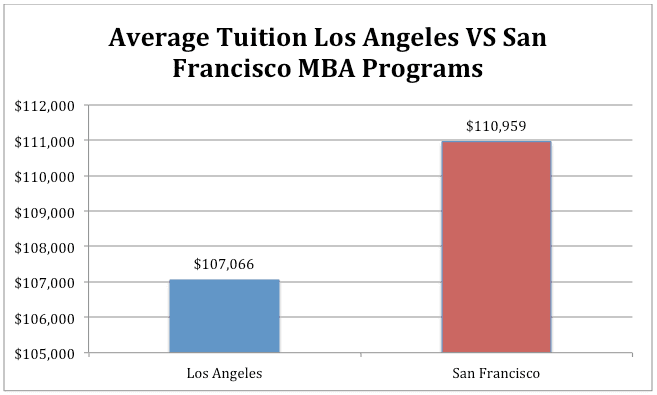
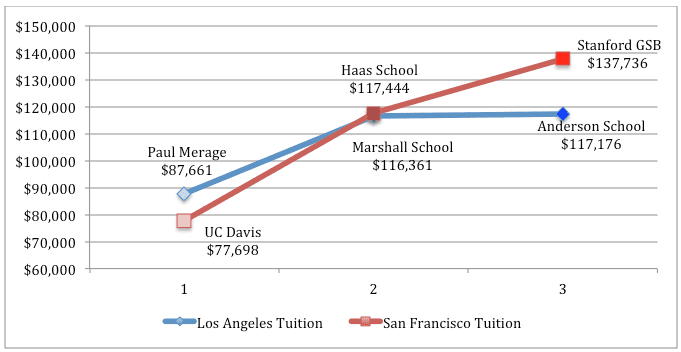
California MBA GMAT Averages
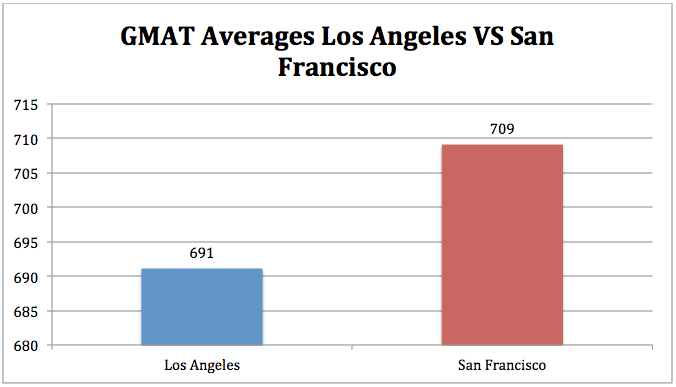
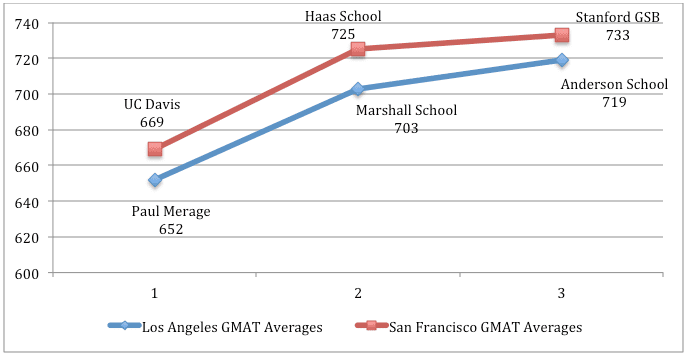
California MBA Post-Graduation Salaries
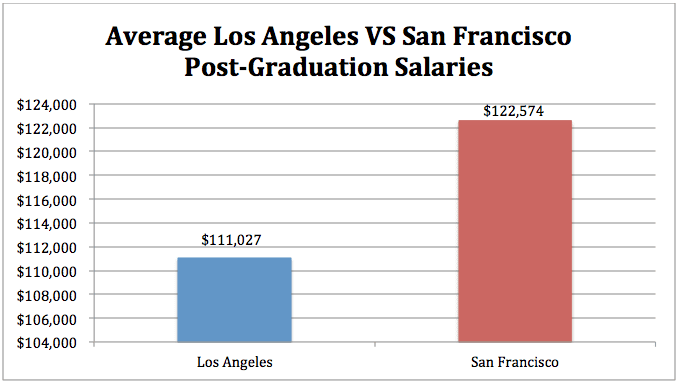
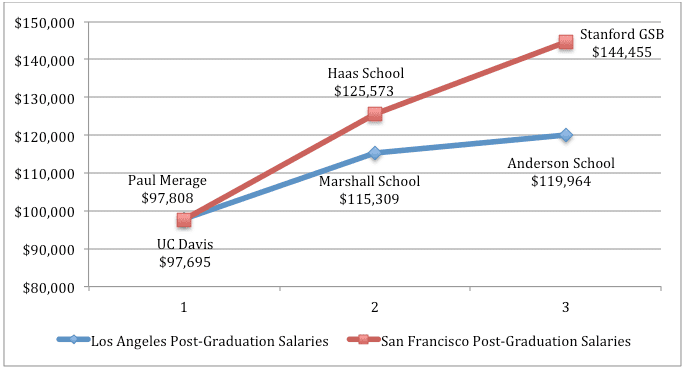
Lehigh MBA Success, and More – New York City News

Let’s explore some of the most interesting stories that have emerged from New York business schools this week.
Extraordinary Outcomes for Lehigh’s 1-MBA and M2 Programs – Lehigh College of Business and Economics
This past spring saw Lehigh graduates from the College of Business and Economics’ inaugural 1-MBA (1-year full-time MBA) cohort, as well as the third cohort of its M2 (MS in Management) complete the transition from the classroom to the boardroom.
Employers like Tesla, QVC, and Hubspot snatched up 1-MBA graduates while Amazon, Bloomberg, IBM, KPMG, and more extended offers to nearly 80 percent of M2 graduates. This statistic is very much in line with figures from the 2017 graduates of the M2 program—96 percent of which were employed within three months of graduation by the likes of Deloitte, Vanguard, IBM, and Amazon.
You can read more about the recently Lehigh MBA success here.
School of Management Students Provide Support to Businesses Looking to Export – Binghamton SOM Blog
This semester, Binghamton SOM students took part in the six-month ExportNY “Launch into the Global Marketplace” program, a unique offering that adjunct assistant professor founding director of the Center for International Business Advancement (CIBA) Elena Iankova developed to help give “regional businesses [the] knowledge and resources needed to export their products.”
The basic idea that underlies the “Launch into the Global Marketplace” program is that students research, consult, and support the export plans of participating businesses. Iankova explains: “It’s a two-way street. The students provide the companies research assistance and consultation, and the companies provide the students real-life experiential learning opportunities, helping them develop their management research and consulting skills.”
The program is a partnership between the CIBA and the Alliance for Manufacturing & Technology (AM&T), the Global New York Program of Empire State Development, and the U.S. Commercial Service and the Small Business Administration.
One of the participating companies, Awestruck Ciders, “produces hard ciders from NY state apples” and hopes to export its product to the South African market. Co-founder Patti Wilcox writes: “We think it’s important to the local economy to expand our view of the market on a global scale. We’re fascinated by this idea of an international cultural exchange, and we think doing so commercially is very valuable.”
You can read more about the program here.
The Endless Scroll: How to Tell if You’re a Tech Addict – PC Mag
Just recently, PC Mag dropped its lengthy article “The Endless Scroll: How to Tell if You’re a Tech Addict,” written by Rob Marvin.
In the piece, Marvin highlights Irresistible: The Rise of Addictive Technology and the Business of Keeping Us Hooked from NYU Stern School of Business professor Adam Alter, who doesn’t mince his words when it comes to tech addiction.
“There’s a myth that there’s something different about people with addictions from people without addictions,” Alter explained in his interview with Marvin. “Right now, if you are a person who doesn’t have an addiction, does that make you in some qualitative or categorical way different from people who do? The more I’ve studied this, the more I realized that just isn’t true.”

“Right now, if you are a person who doesn’t have an addiction, does that make you in some qualitative or categorical way different from people who do? The more I’ve studied this, the more I realized that just isn’t true.” – NYU Stern professor Adam Alter, interviewed by PC Mag / Photo via PC Mag
You can read more from Marvin’s excellent piece, out now, over at PC Mag.
Top MBA Recruiters: IBM

Finding a job after graduating with your MBA isn’t typically the issue. There are hundreds of industries and companies that would be happy to hire a freshly minted MBA graduate. The trouble is choosing the right company and job for you. If IBM hasn’t been on your list of top tech companies, maybe it should be.
About IBM
Headquartered in Armonk, New York—north of NYC and bordering Connecticut—IBM (International Business Machines Corporation) is a multinational technology company that operates in over 170 countries worldwide. It got its start in 1911, and since that time has manufactured leading-edge computer hardware, middleware, and software. The company also provides hosting and consulting services across the technology industry on topics ranging from mainframe computers to nanotechnology.
IBM is dedicated to a constant state of innovation, which is evidenced by its performance. In 2017, the company earned $79.1 billion in revenue and demonstrated that it’s still a cutting-edge technology company by expanding on many of its services including the IBM Cloud—who’s revenue accounted for 21 percent of total revenue. Other top products from the company include:
- z14: The world’s most powerful transaction system that encrypts data at scale, all the time.
- POWER9: POWER9 systems and software cut training times by 4x and boost AI accuracy.
- IBM Q Experience: The world’s first (and only) prototype 50-qubit system, which leads in quantum computing.
And IBM is always looking for new ways to be competitive. Last year, the company spent $5.6 billion on research and development. And in 2016, IBM filed 8,000 patents (the most of any company). It’s a company that is moving forward quickly, which can make it an exciting prospect for many MBA students. So, why should you work for IBM?
Why IBM?
Nicknamed Big Blue, the appeal of working for a company like IBM is fairly obvious. It’s one of the world’s largest employers with over 380,000 employees as of 2016, and those employees are top notch. Throughout the company’s history, employees have been awarded:
- Five Nobel Prizes
- Six Turing Awards
- Ten National Medals of Technology
- Five National Medals of Science
And some former IBM employees include Apple CEO Tim Cook, Microsoft Chairman John W. Thompson, SAP Co-Founder Hasso Plattner, and former Lenovo CEO Steve Ward.
In addition, if you choose to work for IBM, you have the opportunity to work almost anywhere in the world. The company has several main campuses across the globe including:
- Austin, Texas
- Raleigh-Durham, North Carolina
- Rochester, Minnesota
- New York City, New York
- Silicon Valley, California
- Rome, Italy
- Winchester, UK
- Johannesburg, South Africa
- Tokyo, Japan
And that’s just to name a few of IBM’s premier locations. And no matter where you land a job, you’ll be called an “IBMer” and receive a myriad of benefits including group life insurance, survivor benefits, paid vacation, and more.
In 2017, IBM was also recognized by Mogul as one of the Top 100 Innovators in Diversity & Inclusion as well as one of the Top 100 Companies for Millennial Women. And in 2015, IBM was named to Working Mother’s 100 Best Companies list for the 30th consecutive year.
Landing a Job at IBM
So, how do you land a job at IBM as a new MBA graduate? There are a few options. The first is the IBM General Management Leadership Development Program (GMLDP), which is the premier leadership development program for top MBA graduates. If you’re accepted, you’re hired into IBM on an accelerated path to leadership with opportunities across many of IBM’s areas including cloud, Watson, digital, offering management, and consulting.
And speaking of consulting, MBA graduates also have the opportunity to work as consultants in IBM Global Business Services. Within this area, MBA consultants are given a chance to combine sophisticated analytics with market-leading global solutions to provide deep industry insight and expertise alongside an actionable plan.
At any given time, there are over 5,000 job openings available in every industry and area from project management to marketing. Some available jobs for MBA graduates include:
- Strategy Consultant
- Projects Manager
- Account Executive
- Offering Manager
- Associate Partner for Tech/Data Strategy
- Digital Business Consultant
- Business Analyst
Meet an Employee
According to Nish Parekh, who leads IBM’s client and partner programming teaching businesses how to use IBM’s Watson technology, she’s living her dream. With Watson, she gets to work on the leading edge of AI technology and touch a variety of industries, which is exciting in and of itself.
“They bring in a lot of people from different parts of IBM, as well as some folks from outside IBM. Seeing the mix and all these people work together is fun. I get to learn from them,” Parekh told Fast Company. “Also, one of the greatest things about my job is the ability to stay on top of the latest and greatest technology. AI is up and coming; it’s exciting to be a part of that moment.”
